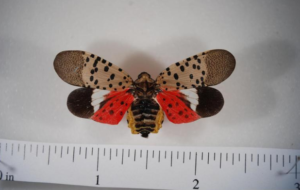
The lawn pest, the spotted lanternfly, has been spotted in two Maryland counties.
The spotted lanternfly (Lycorma delicatula), a pest severely damaging to plants and lawns, has recently had sightings confirmed in Harford and Cecil counties of Maryland. The planthopper is native to China, India, and Vietnam, but it was detected in Pennsylvania in 2014 and has since had confirmed populations in Delaware, New Jersey, Virginia, and Maryland. The lanternfly has a preferred host in the tree-of-heaven (Ailanthus altissima), but it has been known to feed on a wide range of plants. Read on to learn more about this pest, how to spot it, and how to be vigilant in preventing its spread into the rest of Maryland.
The Damage it Causes
From Plant Feeding
The nymph and adult spotted lanternflies feed on plants by sucking fluids from the stems or leaves. This has been shown to cause stunted growth, localized damage, reduced yields, and even death of the plant.
From Honeydew Secretion
As the spotted lanternfly feeds, it excretes a sugary substance known as honeydew. This honeydew is attractive to unwelcome lawn insects like ants, and wasps and is colonized by sooty mold. The mold can cause parts of the plants to become blackened, which reduces photosynthesis and severely affects the quality of the plants.
The Appearance of the Spotted Lanternfly
The adult lanternfly is about 1 inch, or 2.5 cm, in length. The fore wings are greyish-brown with black spots, and the wingtips have a darker, brick-and-mortar pattern. The hind wings are mostly red with black spots, followed by a white band and a black tip.
When the lanternfly is at rest, a hint of red can be seen through the forewings, but the color will be especially notable when the pest is in flight. The body is mostly black, but the abdomen is mainly yellow, with black bands going down its length.
The Life Cycle and Egg-Laying
Adults can be found as early as July and will remain active until the onset of winter. In late fall, adults mate, and the female begins egg-laying. Spotted lanternfly females prefer to lay the eggs on the tree-of-heaven but will lay their eggs on any flat vertical surface available. These surfaces could include other trees, stones, vehicles, and outdoor furniture.
The eggs are laid in groups of 30-50 and coated with a waxy gray film. When the film has dried, it can look similar to a splash of mud, which makes the eggs challenging to spot. The eggs will hatch in the spring, either late April or early May. When first hatched, the nymphs are small and black with white spots. As nymphs mature, they begin to show red coloring, especially around their head, abdomen, and wing pads. The nymphs have a habit of crawling up a tree in the morning and down in the evening. Because they do this in large groups, this movement can be very noticeable.
Scientific Plant Service Is Your Go-To Source In Landscape Healthcare
Scientific Plant Service, located in Baltimore, is a privately-owned corporation, chartered in Maryland in 1957 by Frank J. Burke. We started as a full-service Arborist specializing in the care of shade trees and ornamental shrubs, but today we are a lawn and total landscape care company that is a huge part of the community. From aquatic environments and snow management to deer and mole control, SPS has services tailored specifically for your lawn and landscape.
We offer services in Maryland, Washington DC, and Virginia, including Harford, Baltimore, Carroll, Frederick, Howard, Anne Arundel, Montgomery, Prince Georges, Talbot, Queen Anne’s, and Calvert counties in MD, as well as Loudoun County, Fairfax County, Arlington, Alexandria, and Falls Church in VA. For more information, contact us online, or call us at 410-321-0970. Be sure to follow us on Facebook, Twitter, LinkedIn, and Pinterest!

